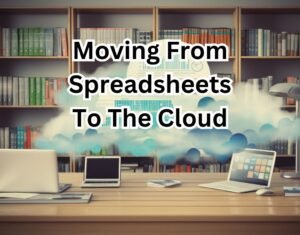Top Reasons To Switch: From Spreadsheets to a Cloud CRM?

Businesses and solopreneurs are constantly seeking tools to streamline their business, enhance customer relationships, and boost sales. Enter CRM (Customer Relationship Management) systems, the superheroes of modern business tools. But like every superhero, there are variations: the in-house CRM and the SaaS (Software as a Service) CRM. So, which one should you choose? Let’s dive deep into the battle of the CRMs.
From Spreadsheets to SaaS CRM: The Modern Shift
Many businesses, especially startups and SMEs, begin their customer management journey with tools like Excel or Apple Numbers. While these tools are great for basic data storage, they lack the advanced features, security, and ease of use that a dedicated CRM system offers.
Why make the shift?
- Security: Online CRMs, especially SaaS versions, come with robust security features, ensuring your customer data is safe from breaches.
- Centralization: No more juggling between multiple sheets or files. Everything you need is in one place.
- Automation: From sending follow-up emails to generating reports, automation features in CRMs save time and reduce errors.
- Collaboration: Multiple team members can access and update the CRM in real-time, ensuring everyone is on the same page.
In-house CRM: The Homegrown Hero
What is it? In-house CRM systems are software solutions developed internally or customized by a third-party but hosted on a company’s own servers.
Pros of Homegrown In-house Software:
- Customization: Since it’s developed in-house, you can tailor it precisely to your business needs.
- Data Control: All data remains within the company’s infrastructure, which can be a plus for businesses with sensitive information.
- Offline Access: No need for internet access to get to your data.
Cons of Homegrown In-house Software
- High Initial Costs: Development, hardware, and software licenses can be pricey.
- Maintenance: You’re responsible for updates, bug fixes, and dealing with potential downtimes.
- Scalability Issues: As your business grows, you might need to invest more in infrastructure and further customization.
SaaS CRM: Online Software to Run Your Business
What is it? SaaS CRM is a cloud-based service. Instead of being hosted on a company’s servers, it’s hosted on the provider’s servers and accessed via the internet.
Pros of Online SaaS CRM
- Cost-Effective: Typically, you pay a subscription fee. No hefty initial investments. And most online CRM’s, have the ability to increase the size of your database as you grow. And will allow you to add additional users as you grow without any need for programmers come in and reprogram your servers or add additional equipment.
- Easy Upgrades: The service provider handles updates and new features. As opposed to what happens with in-house systems, where any customization requires an expense
- Scalability: As your business grows, you can easily adjust your subscription to fit your needs.
- Accessibility: Access your data from anywhere with an internet connection. This is a big one, it allows entrepreneurs to run their business, even when on vacation or offsite. For example, the other day I was in the hospital, waiting for my significant other, and I was still able to run my business from my phone.
Cons of Online SaaS CRM
- Internet Dependency: No internet, no access. This is definitely a concern if your business is in the wilderness or you wish to access your database remotely. But remember, in-house systems only work in house and the availability of Internet today is pretty universal. Especially with companies like Starlink satellite Internet available, almost worldwide
- Customization Limits: While many SaaS CRMs offer customization, there might be limits compared to in-house solutions. However, most sass CRM have all the tools you need to run your business. It may not look the way you’re used to, but after a little bit of utilization, in most cases, you’ll be better off then with an in-house system.
- Data Control: Since data is stored off-site, some businesses might have concerns about security and compliance. But this is usually not the case anymore with SSL certificates and bank level user security that most CRM’s use to protect customer data.
The Verdict
The choice between in-house and SaaS CRM boils down to your business’s specific needs and resources. If you have the budget, technical expertise, and a need for deep customization, in-house might be the way to go. However, if you’re looking for a cost-effective, scalable solution with minimal maintenance, SaaS CRM is a strong contender.
As the great business thinker Peter Drucker once said, “Efficiency is doing things right; effectiveness is doing the right things.” Whether you choose in-house or SaaS, the key is to ensure that your CRM aligns with your business goals and enhances your relationship with your customers.
Ready to explore the world of SaaS CRM? Check out Selling Lane, where efficiency meets effectiveness, and watch your business soar to new heights!
